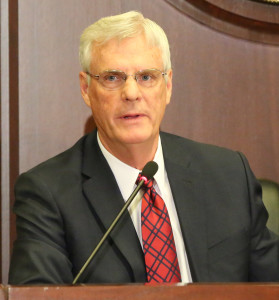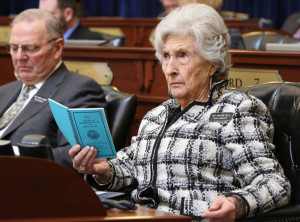The state has been negotiating with two Idaho Education Network vendors since October — in hopes of settling more than $6 million in legal claims.
But when the state absorbed another resounding defeat in court Tuesday, the negotiations got derailed.

“Right now we’re in a little bit of a cooling-off period,” Senate President Pro Tem Brent Hill told Idaho Education News Thursday. “People want to go back to their own corner.”
Hill, R-Rexburg, confirmed that the settlement talks began last fall. The talks haven’t broken down, he said. But for now, nobody is talking.
Here’s the crux of the matter, and it is messy.
- Two contractors — Education Networks of America and CenturyLink, also known as Qwest — received $29.7 million to provide high-speed Internet to Idaho’s high schools.
- As the protracted Idaho Education Network contract lawsuit worked its way through the state’s courts, the state cut off payments to vendors. In March 2015, ENA and CenturyLink filed separate tort claims against the state, seeking more than $6 million in back payments, interest and other damages.
- Meanwhile, the state continued to defend the Idaho Education Network contract, which had a value of $60 million. On Tuesday, a unanimous Idaho Supreme Court upheld a district court ruling that declared the broadband contract void. And the high court offered the state a less-than-subtle reminder: Because the broadband contract has been declared void, the state must seek repayment from vendors.
Hill understands the Supreme Court’s point. The law doesn’t provide the state any choice but to demand its money back. But the repayment issue casts a cloud over the negotiations process, Hill said.
And the law, in turn, puts Idaho in a corner. Lawmakers have even talked about reworking the language to provide the state some leeway on demanding repayment. “(But) what’s the appearance of that?” Hill said. “You hate to change the statute for one particular case, especially when it involves the state itself.”
House Minority Leader John Rusche hasn’t been a party to settlement negotiations. However, he recognizes the dilemma and understands the vendors’ argument. “They did provide some services,” said Rusche, D-Lewiston.
It’s up to vendors to make the next move.
The 2015 tort claims set the stage for a possible lawsuit. The state had 90 days to respond to the claims, but didn’t. That means ENA and CenturyLink could sue the state.
Neither vendor has sued the state — yet.
“While at this time we have not filed a lawsuit, CenturyLink provided services in good faith to state agencies and the Idaho Education Network, as a subcontractor, under the broadband contract,” CenturyLink spokesman Mark Molzen said Thursday. “We have not been paid for these services. We expect the state to fulfill its obligation to pay for those services, just as it would for any other services it contracted for and benefited from.”
CenturyLink’s tort claim did not seek a specific sum of money. Instead, the company said it was owed “full payment for all services rendered,” plus 12 percent in annual interest. CenturyLink has said it was owed at least $1.5 million by the state and ENA, the lead contractor on the Idaho Education Network.
In its tort claim, ENA said it sought roughly $6 million, “including ancillary damages, plus statutory interest, costs, expenses and reasonable attorneys’ fees.”
Tuesday’s ruling could have significant implications for Idaho taxpayers. For one thing, the state could be forced to pay back or write off some $25 million in federally administered telephone surcharges — payments to cover the bulk of the Idaho Education Network’s operating costs.
The immediate impact is unclear, though. Tuesday’s ruling comes just as the Legislature is winding up its 2016 session — and the Joint Finance-Appropriations Committee is writing 2016-17 budgets.
That timing is somewhat “fortuitous,” said Sen. Shawn Keough, R-Sandpoint, a co-chair of JFAC. But Keough isn’t sure what impact the ruling will have on the 2016-17 budget.

JFAC’s House co-chair doesn’t anticipate much of an immediate impact, with one exception.
Budget-writers will have to scrounge up more money for legal fees, said Rep. Maxine Bell, R-Jerome. Siding with the district court, the Supreme Court said Syringa Networks is entitled to more than $930,000 in legal fees for its suit to overturn the Idaho Education Network contract.
As JFAC divvies up a $3 billion state budget, the $930,000 shouldn’t be too hard to find, Bell said. “When we’re told to take care of it, we’ll take care of it.”
